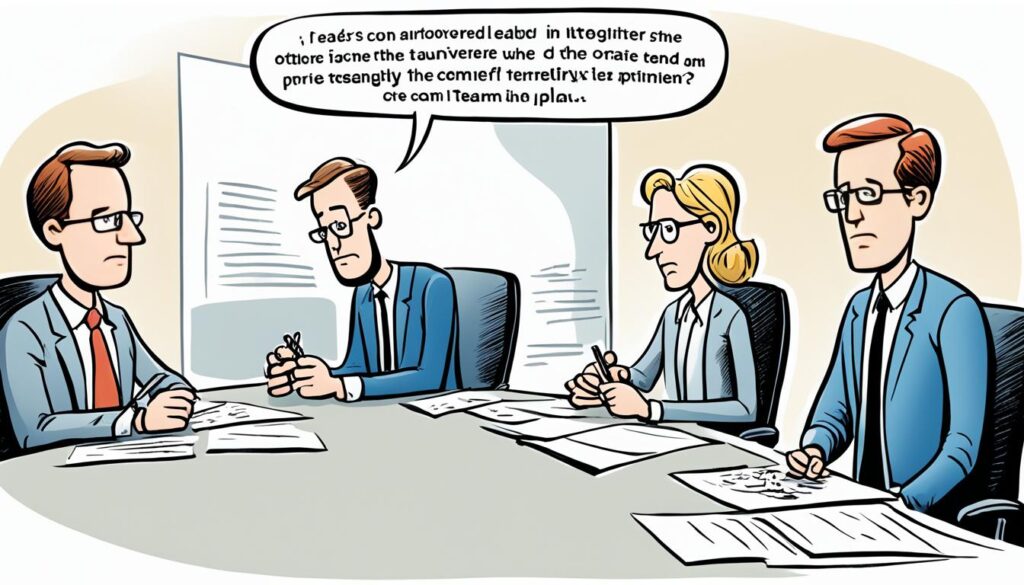When you think of dominance, do introverts come to mind? Many people believe that dominance is exclusively a trait of extroverted individuals, associating introverts with shyness and passivity. However, recent research and insights challenge this misconception, highlighting the unique qualities that introverts possess and how they can excel in various situations. So, can introverts really be dominant?
In this article, we will delve into the world of introverts and unravel the hidden power behind their calm demeanor. We will explore nine situations where introverts shine, showcasing their leadership qualities and debunking the myths surrounding introverted dominance. Prepare to have your beliefs challenged and your perspectives expanded.
Key Takeaways:
- Introverts possess unique qualities that allow them to excel in various situations and assert their dominance.
- One-on-one conversations provide a space for introverts to shine and exert their dominance through active listening, empathy, and insightful contributions.
- Introverts excel in written communication, utilizing their deep thinking and reflection skills to express themselves effectively and assert their dominance.
- Strategic thinking is a domain where introverts truly shine, using their analytical skills and attention to detail to make informed decisions and plans.
- Introverts demonstrate a keen sense of observation and analysis, allowing them to understand complex dynamics and make insightful observations to assert their dominance.
1. One-on-One Conversations
One-on-one conversations provide a space for introverts to shine and assert their dominance.
Introverts often excel in active listening, allowing them to fully understand and respond thoughtfully to the other person’s thoughts and feelings.
They tend to ask insightful questions and provide valuable input, making the conversation more meaningful and impactful.
Introverts have a natural inclination towards empathetic communication, which can create a strong connection and influence the other person.
Their calm and composed demeanor during one-on-one interactions can create a sense of trust and respect, leading to effective leadership and dominance.
2. Written Communication
Introverts have a unique advantage in written communication when it comes to asserting their dominance in a particular domain. Their natural tendency to think deeply and reflect before speaking allows them to excel in expressing their thoughts and ideas through the written word.
When introverts engage in written communication, they have the opportunity to carefully craft their messages. This allows them to ensure that their words are well-thought-out, impactful, and convey their expertise and knowledge effectively. By taking the time to reflect on their ideas and choose their words carefully, introverts can create written content that is insightful and thought-provoking.
Through the power of introspection, introverts can tap into their inner reserves of knowledge and produce written works that showcase their depth of understanding in a specific field or subject matter. Their well-researched and articulated writings can demonstrate their expertise, making them dominant figures in their chosen domain.

| Advantages of Introverts in Written Communication | Examples |
|---|---|
| 1. Thoughtful and Reflective | – Well-crafted blog posts that explore complex topics – Comprehensive research papers that offer unique insights – Insightful articles that challenge existing thoughts and paradigms |
| 2. Clear and Cohesive | – Precise and effective business reports – Convincing sales and marketing copy – Engaging and impactful storytelling |
| 3. Expertise Showcasing | – Authoring influential books in a specific field – Guest blogging on industry-leading websites – Contributing authoritative research papers to academic journals |
| 4. Depth of Knowledge | – In-depth and informative whitepapers – Comprehensive how-to guides – Detailed and well-thought-out technical documentation |
In summary, the ability of introverts to communicate through the written word allows them to leverage their unique qualities and dominate in their respective fields. Their thoughtful and reflective approach, coupled with their expertise and in-depth knowledge, positions them as influential figures in written communication and empowers them to assert their dominance.
3. Strategic Thinking
Strategic thinking is a key domain where introverts can truly showcase their dominance and excel. With their innate inclination to analyze situations from different perspectives, introverts possess the ability to make well-informed decisions that can greatly impact outcomes.
Introverts’ preference for deep thinking and introspection allows them to consider all possibilities and devise well-thought-out strategies. By leveraging their dominant introverted personality traits, such as their calm and focused nature, introverts can navigate complex problems efficiently, making them highly effective in strategic thinking.
For example, imagine a business scenario where a company is facing increasing competition. An introverted leader, with their dominance traits in introverts, would thoroughly analyze the market dynamics, competitor strategies, and potential opportunities for growth. Their ability to anticipate challenges and opportunities based on their long-term planning skills would enable them to devise effective strategies to maintain the company’s competitive edge. This strategic thinking would position the introverted leader as a dominant force in shaping the company’s future.
| Benefits of Introverts in Strategic Thinking |
|---|
| 1. Analyzing situations from various perspectives |
| 2. Considering all possibilities and outcomes |
| 3. Efficiently navigating complex problems |
| 4. Anticipating challenges and opportunities |
Introverts’ dominance in strategic thinking can be attributed to their unique introverted characteristics that align perfectly with this domain. Their natural inclination for deep thinking, calm demeanor, and ability to consider multiple perspectives make them well-suited for crafting effective strategies and driving success.
4. Observation and Analysis
Introverts possess inherent leadership qualities that make them excel in various domains. One such quality is their keen sense of observation and analytical skills. They have an innate ability to pay attention to small details that others might overlook, allowing them to have a deeper understanding of their surroundings and the people they interact with.
Introverts are skilled at reading nonverbal cues, accurately assessing body language and expressions. This skill allows them to decipher underlying messages and navigate complex dynamics effectively. Their ability to analyze and interpret information gives them an edge in understanding the intricacies of different situations and making insightful observations.
As leaders, introverts leverage their observational and analytical skills to gather valuable insights and make well-informed decisions. By carefully observing their team and the overall environment, introverted leaders can identify patterns, anticipate challenges, and develop effective strategies to overcome them. Their attention to detail and ability to spot opportunities empower them to lead their team towards success.

For example, let’s consider a scenario where an introverted leader is overseeing a product development team. Through careful observation and analysis, the leader notices that certain team members have been consistently struggling to meet deadlines. Instead of reprimanding them, the introverted leader takes the time to understand the underlying challenges and provide the necessary support and resources. This approach not only improves individual performance but also fosters a positive and collaborative team environment.
To illustrate the impact of observation and analysis in leadership, the following table showcases some key characteristics of introverts:
| Introverted Leadership Qualities | Examples |
|---|---|
| Sharp attention to detail | Noticing subtle changes in team dynamics |
| Ability to read nonverbal cues | Understanding team members’ emotional states |
| Effective analysis of complex situations | Identifying root causes of project setbacks |
| Insightful observations | Recognizing untapped opportunities in the market |
| Data-driven decision-making | Utilizing data analysis to inform strategic choices |
By capitalizing on these introverted leadership qualities, introverts can bring a unique perspective and make significant contributions to their teams and organizations. Their ability to observe, analyze, and interpret information allows them to navigate complex dynamics, make informed decisions, and drive positive change.
5. Independent Work
Introverts thrive in independent work environments where they can focus and utilize their strengths effectively. They often prefer working alone or in small groups, allowing them to fully engage and concentrate on their tasks. This preference for solitary work enables introverts to delve deep into their projects, leading to high-quality and impactful outcomes.
Introverts are self-motivated and assertive in pursuing their goals, which empowers them to take charge and dominate in their areas of expertise. Their ability to work independently and assert themselves contributes to their success as leaders. When given the freedom to work on their own terms, introverts can fully utilize their introverted assertiveness to make independent decisions and achieve remarkable results.
6. Expertise and Knowledge
One of the key strengths that introverts possess is their depth of expertise and knowledge in their respective fields. With their natural inclination towards deep research and exploration, introverts are able to acquire in-depth knowledge and insights that make them dominant in their areas of expertise.
Introverts’ preference for introspection and reflection enables them to continuously expand their expertise and stay up-to-date with the latest developments in their fields. By delving deep into their subjects and immersing themselves in research, introverts are able to acquire a comprehensive understanding that sets them apart.
When it comes to dominance, introverts showcase assertiveness in sharing their knowledge and expertise. Whether it’s presenting in a meeting, participating in discussions, or making decisions, introverts leverage their depth of knowledge to assert their authority and influence.

For example, imagine a team meeting where different ideas for a marketing campaign are being discussed. While extroverted individuals may dominate the conversation with their charismatic presence, it is the introvert with extensive knowledge and expertise in consumer behavior who steps in and provides a well-supported argument for a particular strategy. The introvert’s assertiveness and depth of knowledge make them the dominant voice in the room.
| Introvert’s Dominant Power | Explanation |
|---|---|
| Expertise and Knowledge | The introvert’s depth of expertise and knowledge in their field makes them dominant when it comes to sharing insights and making informed decisions. |
In summary, introverts’ expertise and knowledge, coupled with their assertiveness, contribute to their dominance and influence in their areas of expertise. Their ability to continuously expand and leverage their knowledge sets them apart and positions them as dominant leaders and individuals.
7. Calm Under Pressure
One notable quality that sets introverts apart in leadership roles is their ability to remain calm and composed, even in the face of stressful and high-pressure situations. This trait of introverted dominance allows them to navigate challenges with a level-headed approach, making them effective leaders.
Introverts possess a natural ability to maintain a sense of calmness, which can be attributed to their introspective nature. Their preference for introspection and reflection empowers them to think rationally and make well-considered decisions even when under pressure. By taking the time to carefully assess the situation and consider all possible options, introverted leaders can ensure that their actions are strategic and grounded.
This calm and composed behavior exhibited by introverts is invaluable in leadership roles, as it allows them to inspire confidence in their team members. When facing high-stakes situations, their ability to stay poised and composed can be reassuring to those around them, helping to foster trust and respect.
“In high-pressure situations, remaining calm can help introverted leaders make rational decisions and inspire confidence in their team.”
An example of introverted dominance under pressure can be seen in the world of sports. Tennis player Serena Williams, known for her quiet and focused demeanor, has consistently demonstrated her ability to remain calm even during intense matches. Her ability to maintain composure under pressure has allowed her to make sound decisions and execute strategies effectively, ultimately leading to her dominance in the sport.
When it comes to leadership, the assertiveness of introverts shines through their ability to remain calm under pressure. It is this unique combination of assertiveness and composure that contributes to their effectiveness as leaders, enabling them to navigate high-stakes situations with confidence and influence.
| Benefits of Introverted Dominance Under Pressure |
|---|
| 1. Rational decision-making |
| 2. Inspiring confidence in team members |
| 3. Strategic and grounded actions |
| 4. Foster trust and respect |
By capitalizing on their ability to stay calm under pressure, introverted leaders can leverage this dominant quality to achieve success and inspire their teams.
8. Creative Expression
“Creativity is intelligence having fun.” – Albert Einstein
Introverts possess a unique ability to express their dominance through creative outlets such as writing, art, music, or public speaking. Despite their shy nature, introverts harness the power of creative expression to make a lasting impact in various domains.
Their preference for introspection and solitude allows introverts to tap into their creative potential and express themselves in unique and meaningful ways. By immersing themselves in their inner world, introverts can generate original ideas and produce creations that resonate with others.
Introverts’ introspective nature enables them to delve deep into their ideas, contemplating every aspect and infusing their work with thoughtfulness and contemplation. This thoughtful and reflective approach to creativity sets them apart and gives them a distinct advantage in conveying meaningful messages.
Whether it’s writing a captivating story, creating thought-provoking artwork, composing a soulful piece of music, or delivering a powerful speech, introverts’ ability to express themselves creatively contributes to their influence and dominance.
Example
Imagine a shy but dominant introverted writer who chooses words meticulously, weaving them into compelling stories that captivate readers’ minds. Their ability to immerse themselves in the depths of their imagination and translate their thoughts into engaging narratives allows them to dominate the literary world with their unique storytelling style.
Introverts’ Dominance in Creative Expression
| Creative Outlet | Dominant Traits |
|---|---|
| Writing | Thoughtful and reflective, attention to detail, conveying meaningful messages |
| Art | Introspective and imaginative, unique perspective, resonating with others |
| Music | Emotional and expressive, creating deep connections, conveying powerful emotions |
| Public Speaking | Thoughtful and thought-provoking, captivating audiences, inspiring change |
- Introverts’ creativity is often driven by their rich inner world and unique experiences.
- Their ability to observe and analyze the world around them allows introverts to create original and innovative works.
- Introverts’ thoughtful and contemplative approach to creative expression can inspire others and provoke meaningful introspection.
- By expressing themselves creatively, introverts challenge the stereotype that dominance is solely associated with extroverted individuals.
Introverts’ creative dominance is a testament to their unique talents and strengths. Through their creative expressions, introverts leave a lasting impact on their respective fields and inspire others to embrace their own creative abilities.
9. Leadership by Example
Introverts possess unique leadership qualities that allow them to assert their dominance through leading by example. Their actions and behavior inspire and influence others, making them effective leaders.
One of the key characteristics of introvert leadership is their strong work ethic. They consistently demonstrate a commitment to excellence and a focus on delivering high-quality results. By setting high standards for themselves, introverted leaders motivate their teams to strive for excellence as well.
Furthermore, introverts’ calm and composed demeanor creates a sense of stability and trust within their teams. Even in high-pressure situations, they remain level-headed and make well-considered decisions. This ability to stay calm under pressure inspires confidence in their team members and allows them to effectively navigate challenges.
Introverted leaders also excel in attention to detail and thoroughness. They value precision and ensure that tasks are completed to the highest standards. By paying close attention to every aspect of a project, they exemplify the importance of meticulousness and set an example for their team members to follow.
Overall, introverts’ ability to lead by example and inspire others contributes to their prominent presence in leadership roles. Through their dedication, integrity, and focus on excellence, they earn the respect and admiration of their teams.
FAQ
Can introverts be dominant?
Yes, introverts can be dominant in various situations and domains. Despite the stereotype of introverts being shy and reserved, they possess unique qualities that allow them to assert their dominance effectively. Introverts excel in one-on-one conversations, written communication, strategic thinking, observation and analysis, independent work, expertise and knowledge, remaining calm under pressure, creative expression, and leadership by example. Their introverted characteristics, such as active listening, empathetic communication, deep thinking, analytical skills, independence, expertise, and work ethic, contribute to their dominance and influence.
What are some introverted leadership qualities?
Introverted leaders possess qualities such as active listening, empathy, deep thinking, analytical skills, independence, expertise, calmness under pressure, creativity, and leading by example. They excel in one-on-one conversations, written communication, strategic thinking, observation and analysis, independent work, expertise and knowledge, remaining calm under pressure, creative expression, and leadership by example. Introverted leaders inspire and influence others through their work ethic, integrity, commitment to excellence, stability, trustworthiness, and ability to inspire others.
How can introverts assert their dominance?
Introverts can assert their dominance through various means, such as active listening, empathetic communication, deep thinking, analytical skills, independence, expertise, calmness under pressure, creativity, and leading by example. They can leverage these qualities in one-on-one conversations, written communication, strategic thinking, observation and analysis, independent work, expertise and knowledge, remaining calm under pressure, creative expression, and leadership by example, which allows them to effectively influence and dominate in their respective domains.
What are some debunked myths about introverts?
There are several debunked myths about introverts. One common myth is that introverts are shy and lack assertiveness. However, introverts can assert their dominance in various situations and possess their own unique ways of exerting power and influence. Another myth is that dominance and leadership belong only to extroverts. In reality, introverts can be dominant leaders by leveraging their introverted characteristics, such as active listening, empathy, deep thinking, analytical skills, independence, expertise, calmness under pressure, creativity, and leading by example. Their introverted nature does not limit their ability to excel as leaders.

